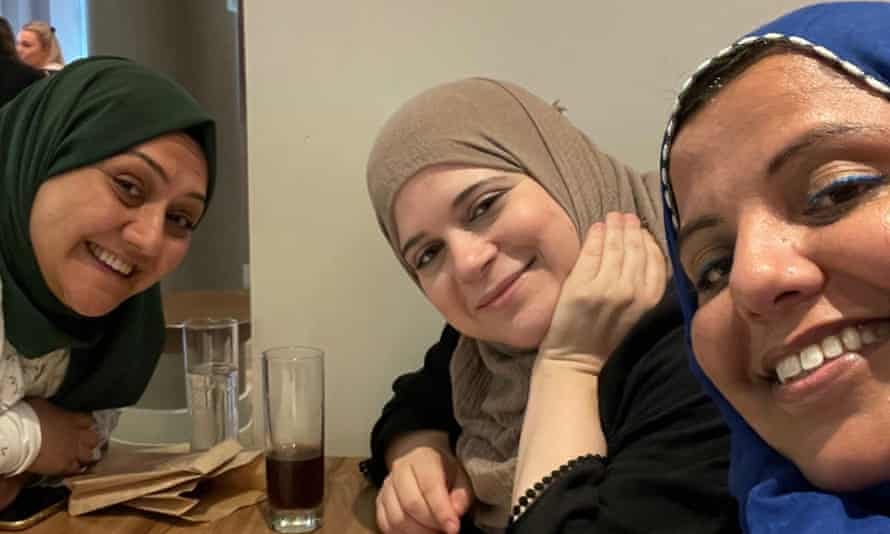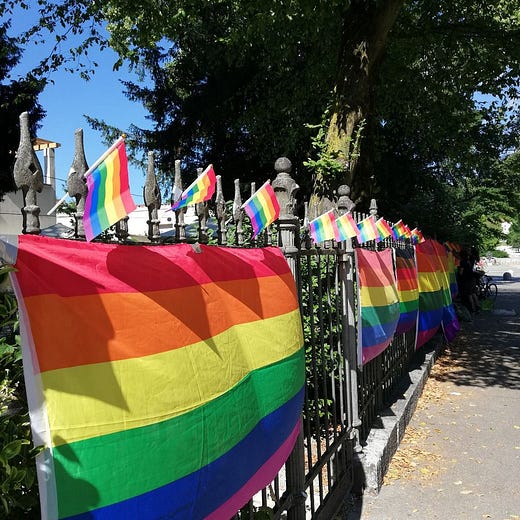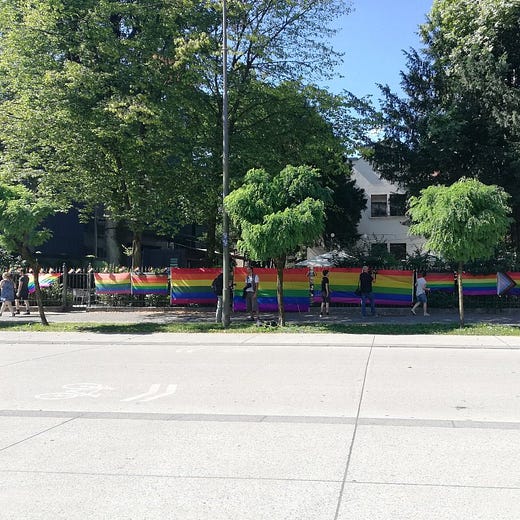Global Roundup: The Three Hijabis vs Racist Football Fans, Building Sober Queer Space, Muslim Women Making the Hajj Alone, Slovenian Activists Protest Homophobic Prime Ministers, Kuwaiti Women vs GBV
Compiled by Inaara Merani
The Three Hijabis Huda, Amna and Shaista. ‘We were on a mission to hug each other, laugh together and watch the England game.’ Photograph: Shaista Aziz/
Around two weeks ago, the men’s Euro Cup ended with Italy beating England at Wembley Stadium in London in a penalty shootout. Three young Black football players on the England side—Marcus Rashford, Jadon Sancho and Bukayo Saka—were subjected to horrific racist abuse after they missed their penalties. The missed penalties were just another opportunity that racists took to attack and abuse Black players, reinforcing the false notion that football is a white man’s sport.
In solidarity with the players and to defend the sport they loved, three British Muslim women created a campaign to fight back against racists. Shaista Aziz, Huda Abdullatif and Amna Abdullatif, who call themselves The Three Hijabis—riffing off the Three Lions as the England team are known—have secured close to 1.5 million signatures on their petition which demands that the English Football Association (FA) create new rules which ban for life anyone who directs online and offline racist abuse at players.
The trio commented that as soon as they heard the last whistle blow after penalties, they immediately knew these three young Black players would be targeted by racist abuse. The players have the option to pursue legal action against these trolls, but The Three Hijabis believe the action should be taken further.
The way racism is framed is as if it’s a one off incident… it’s not as if one incident happens to one person, and then there’s a backlash and an outcry, and then then it stops. – Shaista Aziz
Mother-of-two Huda Jawad explained that the racism is dangerous not just to the players but to supporters too. She said she and her sons cannot risk going to Wembley Stadium “because it’s not safe”.
It’s really sad when you’re someone who lives right next to Wembley, but matches are something we can only watch on TV or hear about from the balcony. It’s also sad for my children to feel that there are some places in their home country where they are not welcome. - Huda Jawad
The Three Hijabis are hopeful that this petition, as well as the outpouring of support over social media, will create a new direction for football, ridding the sport of racists and allowing fans to appreciate the sport and its players.
They epitomise how so many black people and people of colour feel when we go to work. They want to work, they want to go and do their jobs, and they got racially abused and dehumanised and treated in such a disgraceful way. That happens to people of colour up and down this country every day when we go to work as well. – Amna Abdullatif
——————————————————
Elise Kutt. (them.us)
Bux Dhyne, a 40-year old nonbinary drag artist is crowdfunding to open a sober, queer space which will be inclusive of the entire LGBTQ+ community, especially youth. Dhyne is a performer in Grand Rapids, and got the idea to open Joule’s Molly House during the COVID-19 pandemic. They had just created their own production company, which was geared towards local entertainment, when COVID-19 forced queer nightlife, among others, to shut down. After one event, these creators were forced to go back to the drawing board.
Dhyne began to think of the future of queer spaces, and what bars and clubs would look like after things returned to normal. Many of Dhyne’s friends used the pandemic as a time to get sober, which sparked the idea of creating a nightlife-like atmosphere without the drinking.
Here in Grand Rapids, we’re considered ‘Beer City, USA. Everywhere you go, there’s always beer. I wanted to support my friends who are sober, see them be able to still perform, and get to go out with them. – Bux Dhyne
Using Patronicity, Dhyne is hoping to raise $35,000 for this campaign. Currently, the crowdfunding campaign has already raised over $6900, which will allow them to sign a lease and for ground to be broken at Joule’s Molly House. A building has already been selected and business plans have been finalized, now financial support is the only missing factor.
A lot of the initial planning is done, but I am working on funding it. I have an MFA in art. I have a lot of student loans. I am a very typical working, starving artist living paycheck to paycheck. Starting this project is really about finding funds and hoping the community can get behind it. – Bux Dhyne
Although construction has not yet begun, Dhyne has already envisioned what the space will look like, describing it as “a mix between Victorian Medicine and 1940s horror films.” Customers can also expect to see many standard features of LGBTQ+ bars and clubs, including DJ performances and drag shows. They also wanted to make the space accessible for people living with a disability, as well as larger people.
The goal of Joule’s Molly House is to ensure that there is space for everyone. In Grand Rapids, there are only a few places where LGBTQ+ youth can freely express themselves; most queer bars in the city are 21+. Dhyne believes that this sober queer space can help facilitate the interests of the younger queer community, teaching them arts from spoken word to comedy and improv.
I really, really love this generation of kids that are coming up, and I really want to be as supportive to them as I can be. I didn't come out to my family until I was 35. I tried to be married and have kids and live in suburbia twice, and both times it did not stick. The support and the exposure would have meant me being able to start my life a little bit earlier. – Bux Dhyne
Joule’s Molly House follows the example of a number of other safe queer spaces created in the US. Many of these spaces have been threatened by the coronavirus, and have had to shut down as a result. Dhyne is hpeful that Joule’s Molly House will live a long life, and will continue to support the LGBTQ+ community in Grand Rapids and abroad.
There was a comment on a news story today on Facebook, and the guy was like, ‘So it's just a nightclub with no booze?’ and I said, ‘Yep, you got it.’ He's like, ‘Oh, okay. I can get behind that.’ All I'm doing is making a space that's like all of the other spaces we've ever been in, except I'm choosing to serve different drinks. – Bux Dhyne
—————————————————
Pakistani pilgrim Bushra Shah bids her husband farewell before leaving for the hajj -- the first time she can do so without a male guardian. (Yahoo News)
The Hajj is one of the five pillars of Islam; it is an annual pilgrimage to Mecca which all able-bodied Muslims worldwide are expected to complete at least once in their lives. Up until this point, women have only been allowed to make the pilgrimage if they have a male relative present, also known as a mehrem. For many Muslim women, making the Hajj has been a lifelong dream, but too often it has been snatched away because of this misogynistic rule.
However, for the first time ever, women will be allowed to make the Hajj without a mehrem present. The Saudi hajj ministry has officially allowed women of all ages to make the pilgrimage without a male relative on the condition that they go in a group.
This year, only 60,000 pilgrims have been chosen to take part in hajj this year, as COVID-19 has forced the government to drastically scale down. This year, only residents of Saudi Arabia are allowed to take part after being selected from a pool of names. Out of the 60,000 pilgrims this year, around 40% are women.
For Busra Shah, a 35-year old Pakistani resident, this will be her first time making the hajj. Shah and her husband collectively decided that only one of them should make the hajj. Given that this is the first year that women have been permitted to go alone, they decided it was best for her to attend.
Many women will also come with me. I am very proud that we are now independent and do not need a guardian, - Busra Shah
Despite the hajj ministry lifting this restriction, it was unclear for many women across the country. Many travel agencies are still reluctant to allow women to travel without a male family member, and some even posted advertisements which ruled out groups of women travelling without a mehrem. This is indicative of how some of these social changes are being met with resistance. However, despite the resistance from some, women across Saudi Arabia are taking advantage of this opportunity.
It was not easy to take the decision to go alone... but we took this opportunity as a blessing," - Sadaf Ghafoor
—————————————————-
Slovenian LGBT+ activists proudly displayed a variety of Pride flags to welcome the prime ministers of Hungary and Poland during their visit to the country. (Twitter/@RemyBonny) (Pink News)
It is no mystery that Poland and Hungary have implemented many anti-LGBTQ+ and misogynistic policies over the last several months. Upon their arrival into Slovenia, the Hungarian and Polish prime ministers were met with a protest of rainbow flags.
Rémy Bonny, an LGBT+ activist and executive director of Forbidden Colours (a non-profit organization), shared images of the demonstration on Friday, July 9. In the images, Pride flags can be seen intertwined in a fence directly across from the main entrance of where meetings took place with these country leaders.
Despite EU leaders demanding that Hungary repeal its cruel anti-LGBT+ law, the government is not budging and the queer community will face harmful and dangerous repercussions as a result. According to the Hungarian prime minister, ViKtor Orbán,, the new law is not about homosexuality, but it is about children and their parents. How sickening.
The Slovenian prime minister, however, is no better. He has come to the defence of Orbán, stating that the Hungarian leader should be free to express his ideas. It is disgusting to see European leaders defend Orbán and to witness so many misogynists and homophobes who are cruel and enjoy taking away rights from the queer community.
Activists, however, have not stood down and will not stand down until these laws are repealed or until change is enacted. This peaceful act of rainbow defiance is just one way that activists are demonstrating their opposition, and protests will not stop anytime soon.
———————————————
A group of activists including Shayma Shamo conducted a virtual mourning after the murder of Farah Hamza Akbar. (Women’s Media Center)
Farah Hamza Akbar, a Kuwaiti woman, was murdered in broad daylight on April 20. The perpetrator had been harassing and threatening her after she refused his marriage proposal. Despite Akbar filing two separate police complaints and despite her perpetrator being arrested and released on bail, he still murdered her.
Following this murder, Akbar’s sister posted a video calling out the lack of action from the authorities after multiple pleas were made to protect her sister. This video sparked outrage in Kuwaiti society, signalling a social media movement protesting against gender-based violence in the country.
Just three months earlier, a #MeToo movement started in Kuwait, also known as Lan Asket. Ascia Al Faraj, a Kuwaiti blogger, posted a video speaking about the harassment she experiences and witnesses everyday. Following this video, Shayma Shamo, a doctor, founded the Lan Asket Instagram account where victims can anonymously share their stories of sexual harassment, violence and abuse.
In Arab culture, shame acts as a shroud that prevents people from sharing their stories. We are shamed into silence. Kuwait didn’t have a safe space for people to openly share. I wanted to remove that barrier and show that being silent is no longer an option. - Shayma Shamo, doctor
The Instagram account blew up overnight and inspired Kuwaiti society to speak about this stigmatized issue for the first time.
For the first time, so many conservative girls were having online and offline discussions about this unavoidable topic — everyone was talking about it. Clubhouse took off around then and for the first time, Kuwaiti society comes across terms like feminism, patriarchy, and intersectionality. While finally, there was a safe space and open dialogue on sexual harassment, there was also an aggressive, antifeminist outrage. Misogyny is so deep-rooted that certain sections of society continued to negate the daily harassment that we experienced. Najeeba Hayat, activist
Hayat worked closely with Al Faraj to create a social media campaign which countered misogynistic denials of sexual assault by sharing TikTok videos of how she was harassed in public spaces. However, by March, Lan Asket had lost its traction and it seemed like the movement was dying down. That was, until Akbar was murdered, reigniting the fight. Led by Shamo, Hayat and Al Faraj, a group of activists conducted a virtual mourning and encouraged Kuwaitis to post photos and videos wearing all black, showing solidarity with the victim.
It was a highly visual way for women to stand in solidarity with the victim and share our collective grief, anger, and disappointment with a society whose norms and laws facilitated this violence. - Najeeba Hayat
Despite this ongoing movement, Kuwaiti women continue to experience gender-based violence and loopholes exist in the Kuwaiti Penal Code, permitting offenders to evade justice after committing awful crimes. The Lan Asket team is currently creating a support group for victims of gender-based violence, developing a survey to investigate what prevents victims from reporting harassment, and they are also educating women on their rights. Additionally, these activists are educating corporate officials on how to create a safe and inclusive workspace by creating a toolkit which can be used widely.
This fight is nowhere near over, and activists such as Hayat, Al Faraj and Shamo are leading the fight for Kuwaiti women.
————————————————————
Inaara Merani (she/her) is a recent graduate from the University of Ottawa where she studied International Development and Globalization with a minor in Women’s Studies. She is an Ismaili Muslim Canadian who is deeply passionate about human rights, social justice and feminism, and in turn, dismantling the patriarchy and ensuring that all women have safe and equal access to all their rights. She hopes to pursue a career in law so that she can continue to fight for the rights of women and other marginalized groups everywhere. She also enjoys reading, travelling and spending time with her beautiful cat.









